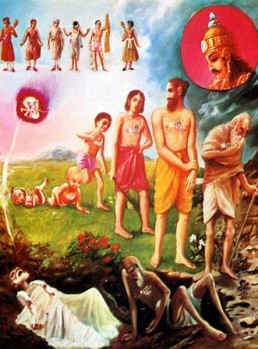Swami Chinmayananda
Swami Chinmayananda Commentary
Without Pratyahara (or Uparati), we can observe cases wherein an individual comes to maintain sense-withdrawal from the sense-objects due to some physical incapacity or due to some special mental mood of temporary sorrow or misery. In all those cases, though the sense-organs come to feel an aversion for the respective objects, their inclination for these objects merely remains dormant for the time being. Similarly, Arjuna doubts that, even in a Yogin, the capacity to withdraw from the temptations of the sense-world, may be temporary and that, under favourable or sufficiently tempting circumstances, they may again raise their hoods to hiss and to poison. His doubt is answered here.
If you observe the flight of the objects of sensuousness from the shops to their customers, you can understand this point very clearly. They always reach only those who are courting them and are panting to possess them. The wine-cellars get emptied when the bottle “walkout” to replenish the side-boards of the drunkards! Ploughs made by the smithy are not purchased by artists and poets, doctors and advocates, but they must necessarily reach the homes of the farmers. Similarly, all sense-objects ultimately reach those who are courting them with burning desires. From one who is completely abstinent, sense-objects must necessarily get repelled.
But even though the sense-objects may, temporarily, seem to turn away from him who is abstinent, the deep taste for them, ingrained in his mind, is very difficult to erase completely. Here Krishna, in his Supreme Wisdom, assures the seeker that these mental impressions of sensuous lives, lived in the past by the ego, from the beginning of creation to date, will all be totally erased, or at least made ineffective — as roasted seeds — when the seeker transcends the ego and comes to experience the Self.
This is not very difficult to understand, since we know that the objects of sorrow and occasions of tragedy in one plane-of-consciousness are not available in another. The kingship that I enjoy in my dream, does not add even a jot to my dignity when I wake up to realise my insignificant existence; so too, my meagre existence in the waking-state will not debar me from the full kingly glory in my dream-kingdom!!
Similarly, the ego, existing now through the waking, dream and deep-sleep states, has gathered to itself a dung-heap of impressions, all purely sensuous. But these cannot be effective when the same ego, transcending these three planes, comes to experience the plane of God-consciousness.
HE, WHO WOULD ACQUIRE STEADINESS OF RIGHT KNOWLEDGE (Prajna) SHOULD FIRST BRING HIS SENSES UNDER CONTROL. FOR, IF NOT CONTROLLED, THEY WILL DO HARM. SO, THE LORD SAYS:
Adi Sankara Commentary
Although visayah, the objects, (i.e.) the organs, figuratively implied and expressed by the word ‘objects’, or, the objects themselves; vinivartante, recede; niraharasya dehinah, from an abstinent man, from an embodied being, even from a fool who engages in painful austerity and abstains from objects; (still, they do so) rasavarjam, with the exception of the taste (for them), with the exception of the hankering that one has for objects. The word rasa is well known as referring to the sense of taste (hankering), as in such expressions as, ‘sva-rasena pravrttah, induced by his own taste (i.e. willingly)’, ‘rasikah, a man of tastes’, ‘rasajnah, a connoisseur (of tastes)’, etc. Api, even that; rasah, taste of the nature of subtle attachment; asya, of this person, of the sannyasin; nivartate, falls away, i.e. his objective perception becomes seedless; when drstva, after attaining; param, the Absolute, the Reality which is the supreme Goal, Brahman, he continues in life with the realization, ‘I verily am That (Brahman).’ In the absence of full realization there can be no eradication of the ‘hankering’. The idea conveyed is that, one should therefore stabilize one’s wisdom which is characterized by full realization. [If it be held that attachment cannot be eliminated without the knowledge of Brahman, and at the same time that the knowledge of Brahman cannot arise until attachment is eradicated, then we get involved in a vicious circle. In answer it is said that gross attachments are eliminated through discrimination which restrains the senses from being overpowered by objects. And the full Knowledge arising thereof eliminates the subtle inclinations as well. Hence there is no vicious circle involved.] Since the organs have to be first brought under his own control by one who desires to establish firmly the wisdom which is characterized by full realization, therefore the Lord speaks of the evil that arises from not keeping them under control:
The Bhagavad Gita with the commentary of Sri Sankaracharya – Translated by Alladi Mahadeva Sastry
Holy Geeta – Commentary by Swami Chinmayananda
The Bhagavad Gita by Eknath Easwaran – Best selling translation of the Bhagavad Gita
The Bhagavad Gita – Translation and Commentary by Swami Sivananda
Bhagavad Gita – Translation and Commentary by Bhaktivedanta Swami Prabupadha
Srimad Bhagavad Gita Chapter 2 – Verse 59 – 2.59 vishaya vinivartante – All Bhagavad Gita (Geeta) Verses in Sanskrit, English, Transliteration, Word Meaning, Translation, Audio, Shankara Bhashya, Adi Sankaracharya Commentary and Links to Videos by Swami Chinmayananda and others – 2-59

